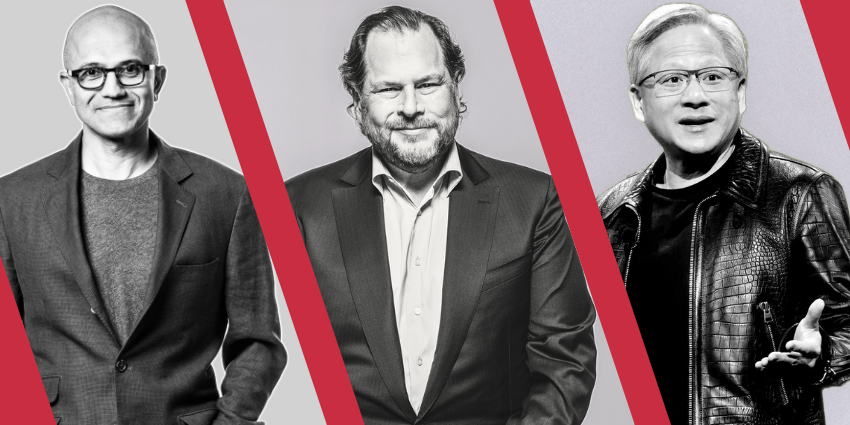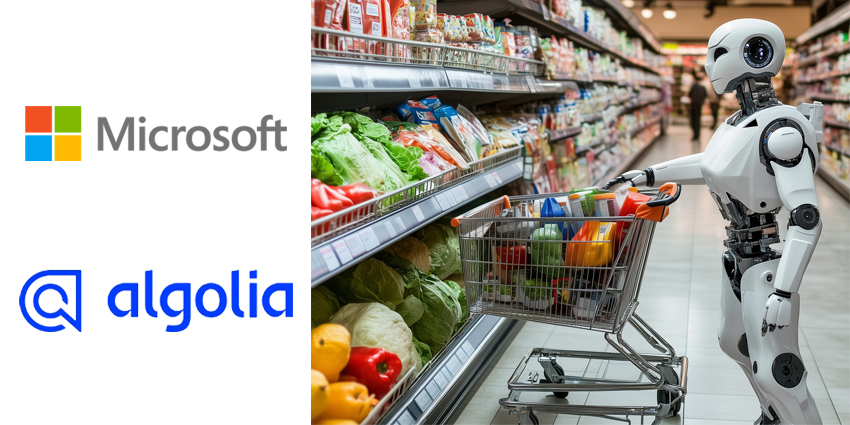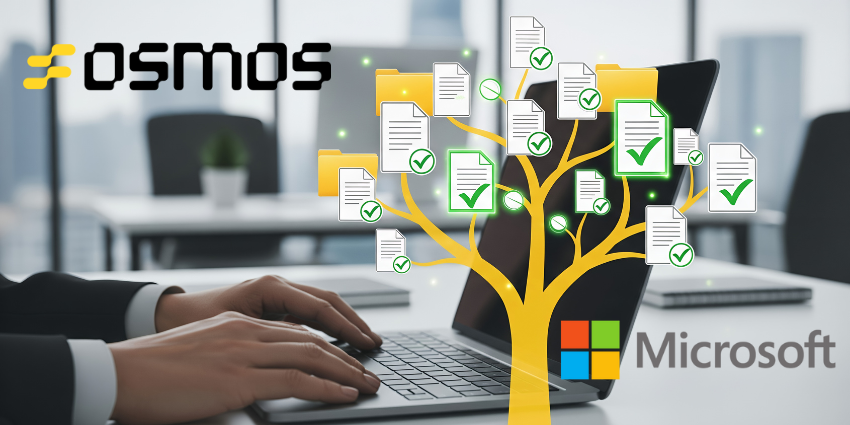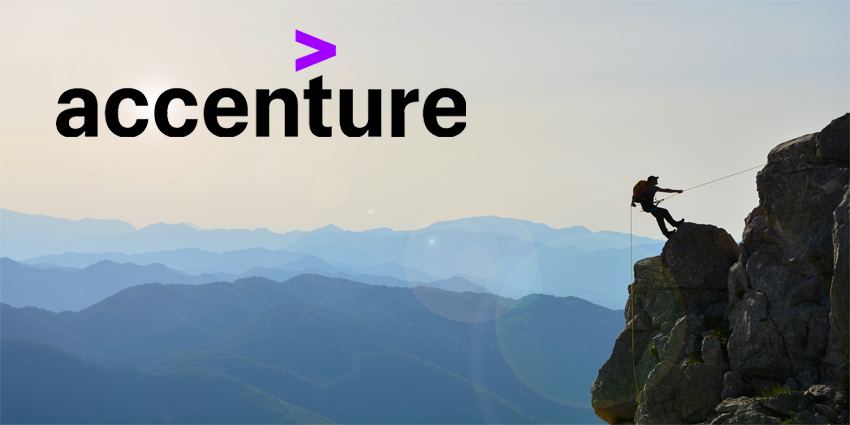Copilots and AI Agents are taking the world by storm.
First, Copilots – the AI companion tools created by Microsoft, Google, AWS, Zoom, Salesforce, and countless other organizations—are paving the way for a new era in which every employee has access to a personalized, intelligent assistant ready to increase their productivity.
AI Agents, on the other hand, are transforming teams, handling countless multi-stage tasks connected to sales, marketing, customer service, and even business management autonomously.
So, what do these increasingly sophisticated “bots” mean for the future of work?
Here are some of the hottest takes from the most influential leaders in the technology industry.
Microsoft CEO Satya Nadella: Copilot Becomes the UI for AI
Microsoft has proven itself one of the top AI innovators in the last few years, thanks largely to its OpenAI relationship.
With Copilot, Microsoft gave employees access to virtual assistants that they could access within the apps they already use daily, from Microsoft 365 productivity apps to Teams.
Now, Microsoft is diving into a new wave of AI transformation with pre-built and customizable agentic AI assistants and its pioneering Copilot Studio platform.
At Ignite 2024, Microsoft’s CEO, Satya Nadella, described Copilot as the “UI for AI”, offering companies a unique “organizing layer for work and how work gets done.”
He said Copilot and AI Agents enable “every employee to have a personalized assistant that knows them, [and] their work,” driving significant improvements in productivity, creativity, and time savings.”
The Power of Simple Customization and Scalability
Microsoft also believes limitless customization is the key to unlocking the true value of Copilots and AI agents. That’s why Microsoft has evolved Copilot Studio into a hub for building and adapting AI Agents.
The promise is that, with Microsoft’s technology, companies don’t need to be data scientists or experienced AI developers to create autonomous agents. Anyone can create an agent “by simply describing it in natural language [and] connecting it to a couple of data sources.”
Moreover, companies can easily scale the functionality of their agents with multi-step actions, automating more business processes faster, so human beings can focus their attention on other creative, strategic initiatives. Nadella added:
What lean did for manufacturing, AI will do for knowledge work. It’s all about increasing value and reducing waste.
For example, he referenced the risk analysis teams at the Bank of Queensland, who use AI agents to reduce the analysis work that usually takes weeks into a process that takes less than a day.
Nadella also highlighted the versatility of AI agents, sharing how Vodafone uses virtual assistants to handle more than 45 million customer conversations each month.
Lastly, he explained how McKinsey built an autonomous agent that reduces client onboarding time by up to 90 percent.
Microsoft believes that as AI copilots and agents redefine productivity, the question isn’t whether to adopt them but when, as Nadella put it, “not if, but when. And the answer to when is now.”
Marc Benioff: Copilots and AI Agents Are the Second & Third Waves of AI
Salesforce has proven a pioneer of AI Agents. The company was one of the first to introduce organizations to the power of enterprise AI with its Einstein ecosystem. Now, it’s leading the agentic AI space with Agentforce.
At Dreamforce 2024, Marc Benioff, Salesforce’s CEO, described AI agents as the “third wave of AI”. He said:
The first time you build and deploy your first autonomous agent…you’re going to remember that moment like the first time you rode in an autonomous car.
That said, Salesforce continues to promote agentic AI solutions as tools designed to “augment” rather than replace human beings.
Whether helping stylists provide personalized shopping experiences or supporting healthcare professionals with critical scheduling and patient follow-ups, Salesforce’s Agentforce enables teams to achieve more with less.
Building a Unique Platform for Human Augmentation
As noted, Salesforce’s new”Agentforce” empowers businesses by automating low-value tasks and enabling higher-value interactions.
At Dreamforce, Benioff shared insights into how these agents operate seamlessly within Salesforce’s platforms, integrating data, metadata, workflows, and security to ensure unparalleled AI accuracy.
Meanwhile, Salesforce has developed new technologies, like its Atlas Reasoning engine, to tackle common issues like AI hallucinations and inaccuracies.
Highlighting real-world applications, Benioff described use cases where Agentforce is already delivering transformative results.
For instance, a major retailer reported resolving “40 to 70 percent of cases” with early versions of Agentforce. That percentage increased to “90 to 95%” with the latest iteration – Agentforce 2.0 – enhanced by the Atlas reasoning engine. The CEO added:
This isn’t just about automation; it’s about giving doctors, nurses, and other professionals more capacity to do their most meaningful work.
Benioff describes the copilots and AI agents built with Salesforce’s Agentforce solution as the ultimate AI revolution.
“This is what AI was meant to be—augmenting employees, delivering better experiences, and driving better business results,” he summarized.
Salesforce hopes to power the future of AI and human collaboration by enabling access to flexible agentic AI development and prioritizing security, customization, and end-user experiences.
Jensen Huang: AI Agents Will Work as Teams of Intelligent Systems That Collaborate Like Humans
Jensen Huang, CEO of NVIDIA – a company powering the future of AI development with intuitive computing systems – shared an exciting insight into the potential of copilots and AI agents at the Dreamforce 2024 event.
He described the paradigm shift in the AI industry. According to Huang, AI agents aren’t just “tools”; they’re dynamic entities capable of reasoning, collaborating, and using resources to solve problems. He continued:
We’re going to be able to give a problem to an Agentforce agent, and they’ll be able to find other agents they can collaborate with to achieve results.
NVIDIA’s leadership team believes that copilots and AI agents will revolutionize problem-solving. They’ll allow companies to create “teams” of intelligent systems that can work together as effectively as a human workforce.
Unsupervised Learning Brings the Future of AI Much Closer
Huang described the introduction of unsupervised learning as a significant breakthrough crucial to the evolution of copilots and AI Agents.
The CEO said the rise of unsupervised learning marked a turning point for AI scalability, noting:
Unsupervised learning allowed us to use language models to create language models that can codify prior human knowledge and learn from multimodal data.
Huang added that this is the first time in human history that technology is moving faster than Moore’s law, which – in simple terms – states that the number of transistors on a microchip doubles about every two years with a minimal cost increase.
As a result, new, more powerful computing systems are enabling the creation of AI Agents at an incredible speed. Those AIs can accelerate the development of next-generation computing systems, creating a rapid development flywheel.
Huang also emphasized the importance of ensuring AI’s safety and trustworthiness in this new landscape. He praised the implementation of guardrails, fine-tuning strategies, and ethical grounding mechanisms. “AI is now examining the quality of the answers it produces,” he added.
Lastly, Huang believes we’re about to enter a new era for enterprise AI, unlocking a “level of automation capability that the world has never seen.”
Copilots and AI Agents: The Future of Innovation and Enterprise Productivity
Microsoft and Salesforce see agentic AI as the future of innovation and enterprise productivity.
However, both company’s priorities vary slightly. Microsoft is focusing on making cutting-edge AI more accessible to the masses and easier to customize via its Copilot.
Meanwhile, Salesforce has made Copilot just another Agent within its agentic AI platform: Agentforce.
NVIDIA, on the other hand, will help both companies – and many other enterprise tech stalwarts – deliver the sophisticated AI that drives new opportunities for faster technology development and growth.







